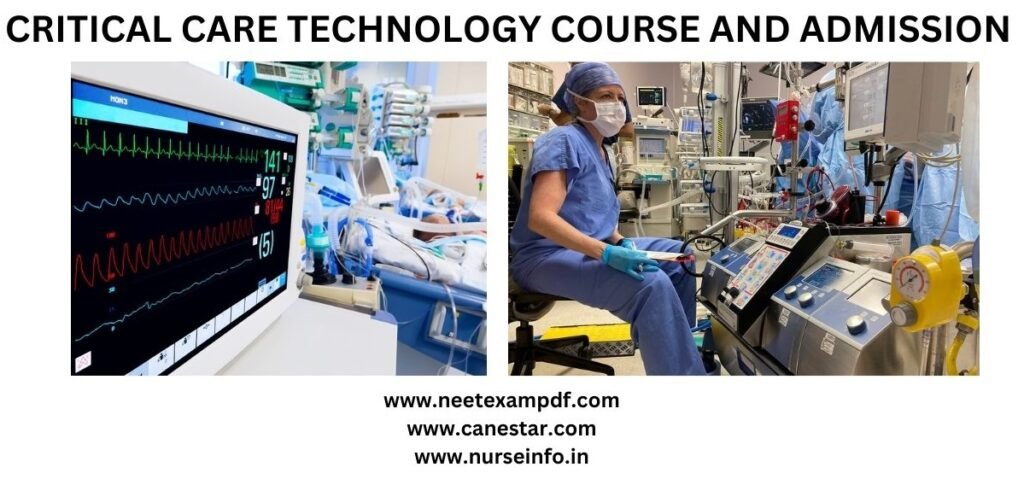CRITICAL CARE TECHNOLOGY COURSE – COURSE, ELIGIBILITY, DURATION, COURSE CURRICULUM, FEE STRUCTURE, CAREER OPPORTUNITY (ABROAD) AND SALARY
COURSE
These courses are designed to equip healthcare professionals with the necessary knowledge and skills to work in intensive care units (ICUs) and other critical care settings. While I cannot provide an exhaustive list of courses, I can give you some examples of institutions and programs that offer critical care technology courses in India:
- All India Institute of Medical Sciences (AIIMS): AIIMS, located in New Delhi, offers a Post Graduate Diploma in Critical Care Medicine. This program is designed for medical graduates and provides comprehensive training in critical care management.
- Manipal Academy of Higher Education: Manipal Academy of Higher Education, based in Manipal, Karnataka, offers a Postgraduate Diploma in Critical Care Technology. This program focuses on the principles and practices of critical care and includes hands-on training.
- Symbiosis Institute of Health Sciences: Symbiosis Institute of Health Sciences, located in Pune, Maharashtra, offers a Postgraduate Diploma in Emergency Medical Services and Critical Care. This program aims to train healthcare professionals in emergency and critical care management.
- Apollo Hospitals Educational and Research Foundation: Apollo Hospitals, a renowned healthcare institution in India, offers various courses in critical care. They provide a Certificate Course in Critical Care Medicine and a Fellowship in Critical Care Medicine, among other programs.
- Christian Medical College (CMC): CMC, based in Vellore, Tamil Nadu, offers a Fellowship in Intensive Care Medicine. This program is designed for doctors who wish to specialize in critical care medicine and provides comprehensive training in ICU management.
ELIGIBILITY
The eligibility criteria for critical care technology courses can vary depending on the institution and program. However, here are some general eligibility requirements commonly observed:
Educational Qualification: Candidates must have completed their 10+2 education from a recognized board with a science background. Some courses may require a specific combination of subjects such as Physics, Chemistry, and Biology.
Minimum Marks: Candidates are usually required to have a minimum percentage of marks in their 10+2 examination. The minimum marks required can vary, but it is typically around 50% or above.
Age Limit: There may be an age limit for admission to critical care technology courses. The age limit can vary depending on the institution and program. It is advisable to check the specific age requirements mentioned by the institution offering the course.
DURATION
The duration of critical care technology courses can vary depending on the institution and program. In general, these courses can range from a few months to a few years. Here are some common duration for critical care technology courses:
- Certificate Courses: Certificate courses in critical care technology typically have a duration of 6 months to 1 year. These courses provide basic training and knowledge in critical care technology.
- Diploma Courses: Diploma courses in critical care technology usually have a duration of 1 to 2 years. These programs offer more comprehensive training and cover a broader range of topics related to critical care technology.
- Bachelor’s Degree Courses: Some universities and institutions offer a Bachelor’s degree in critical care technology, which typically has a duration of 3 to 4 years. These programs provide in-depth education and training in critical care technology, along with a broader understanding of healthcare management and related subjects.
- Postgraduate Courses: Postgraduate courses in critical care technology, such as a Master’s degree or a Postgraduate Diploma, can have a duration of 1 to 2 years. These programs are designed for individuals who already hold a Bachelor’s degree and wish to specialize in critical care technology.
COURSE CONTENT
The specific content of a critical care technology course can vary depending on the institution and program. However, here are some common topics and subjects that are typically covered in critical care technology courses:
- Anatomy and Physiology: A foundational understanding of human anatomy and physiology is usually included to provide a basis for comprehending the functioning of various body systems.
- Medical Terminology: Courses often cover medical terminology used in critical care settings to ensure students are familiar with the specific language and terminology used in the field.
- Principles of Critical Care: The course content usually includes an overview of the principles and concepts of critical care, including patient assessment, monitoring, and management in intensive care units (ICUs) and critical care settings.
- Equipment and Technology: Students learn about the various equipment and technologies used in critical care, such as ventilators, cardiac monitors, defibrillators, infusion pumps, and other life support systems. They also learn about their operation, maintenance, and troubleshooting.
- Pharmacology: An understanding of medications commonly used in critical care, their administration, dosage calculations, and potential side effects is often included in the course.
- Respiratory Care: This topic covers respiratory assessment, oxygen therapy, airway management, mechanical ventilation, and related procedures and interventions.
- Cardiovascular Care: The course may include content on cardiac monitoring, interpretation of electrocardiograms (ECGs), hemodynamic monitoring, and management of cardiovascular emergencies.
- Emergency and Trauma Care: Students may learn about the assessment and management of critically ill or injured patients in emergency and trauma settings, including resuscitation techniques and stabilization procedures.
- Infection Control: Knowledge of infection control protocols, prevention of healthcare-associated infections, and management of infectious diseases is often incorporated into the curriculum.
- Ethical and Legal Considerations: The course may address ethical and legal aspects relevant to critical care practice, including patient rights, consent, and end-of-life care.
FEE STRUCTURE
The average is about 2.5 to 3 lakhs for 3 years.
- Institution: Different institutions may have varying fee structures based on factors such as reputation, infrastructure, faculty expertise, and resources available.
- Program Level: The fee structure can differ for certificate courses, diploma programs, bachelor’s degrees, and postgraduate courses. Higher-level programs generally have higher fees.
CAREER OPPORTUNITY
A career in critical care technology can offer several opportunities for individuals interested in working in healthcare and specifically in critical care settings. Here are some potential career opportunities in the field of critical care technology:
- Critical Care Technologist/Technician: Graduates of critical care technology courses can work as critical care technologists or technicians. They play a vital role in assisting healthcare professionals in the operation, maintenance, and troubleshooting of critical care equipment and technology. They ensure that equipment is functioning properly and accurately monitor patients’ vital signs.
- Intensive Care Unit (ICU) Technician: ICU technicians work directly in intensive care units, assisting doctors and nurses in the care of critically ill patients. They help set up and operate equipment such as ventilators, cardiac monitors, infusion pumps, and other life support systems. They also provide direct patient care, monitor patients’ conditions, and assist in emergency situations.
- Respiratory Therapist: Critical care technology graduates with additional specialized training may pursue a career as respiratory therapists. They focus on providing respiratory care to patients in critical care units, managing mechanical ventilators, administering oxygen therapy, performing pulmonary function tests, and assisting with airway management.
- Cardiac Care Technologist: Some critical care technologists may choose to specialize in cardiac care. They work alongside cardiologists and other healthcare professionals in cardiac catheterization labs, cardiac care units, or cardiovascular operating rooms. They assist in the use of specialized equipment for diagnosing and treating cardiac conditions.
- Clinical Research Associate: With further education or experience, individuals in critical care technology can explore career opportunities in clinical research. They can work as clinical research associates, helping to conduct research studies, collect data, and analyze results related to critical care treatments and technologies.
- Medical Equipment Sales and Support: Graduates can pursue careers in medical equipment sales and support, where they utilize their knowledge of critical care technology to promote and sell medical devices and provide technical support to healthcare facilities.
- Further Education and Specialization: Graduates can also pursue further education, such as postgraduate degrees or specialized certifications, to enhance their career prospects and move into advanced roles such as critical care nurses, perfusionists, or clinical educators.
SALARY
The salary of professionals in the field of critical care technology can vary depending on factors such as experience, qualifications, job location, and the specific role or position held. Salaries may also differ between different countries or regions. Here is a general overview of the salary range for critical care technology professionals:
- Critical Care Technologist/Technician: The salary of critical care technologists or technicians can vary based on experience and location. Entry-level positions may start at around INR 2 to 4 lakhs per annum, and with experience, the salary can increase to around INR 4 to 8 lakhs per annum or more.
- Intensive Care Unit (ICU) Technician: ICU technicians often receive a slightly higher salary compared to critical care technologists due to the specialized nature of their work. Salaries for ICU technicians can range from INR 3 to 6 lakhs per annum for entry-level positions and may increase with experience.
- Respiratory Therapist: Respiratory therapists, who have additional specialized training, tend to earn higher salaries. Entry-level salaries for respiratory therapists in critical care can start from INR 4 to 6 lakhs per annum, and experienced professionals can earn salaries ranging from INR 6 to 10 lakhs per annum or more.
- Cardiac Care Technologist: Salaries for cardiac care technologists can vary depending on the level of specialization and experience. Entry-level salaries may start around INR 3 to 6 lakhs per annum, and experienced professionals can earn higher salaries ranging from INR 6 to 10 lakhs per annum or more.
SALARY ABROAD
The salary of critical care technology professionals can vary significantly when working abroad due to differences in healthcare systems, cost of living, and demand for skilled professionals. Here is a general overview of the salary range for critical care technology professionals in some popular countries:
- United States: Critical care technologists or technicians can expect higher salaries in the United States. Entry-level salaries can range from $40,000 to $60,000 per year, and experienced professionals can earn salaries of $60,000 to $80,000 or more annually.
- Canada: In Canada, critical care technologists or technicians can earn salaries ranging from CAD 45,000 to CAD 70,000 per year for entry-level positions. With experience, salaries can increase to CAD 60,000 to CAD 90,000 per year or more.
- United Kingdom: The salaries for critical care technology professionals in the United Kingdom can vary. Entry-level salaries may range from £20,000 to £30,000 per year, while experienced professionals can earn salaries of £30,000 to £40,000 or more annually.
- Australia: In Australia, critical care technologists or technicians can expect salaries ranging from AUD 50,000 to AUD 70,000 per year for entry-level positions. With experience, salaries can increase to AUD 70,000 to AUD 90,000 per year or more.
If you need more information, comment us below or email us.
Thank you.

